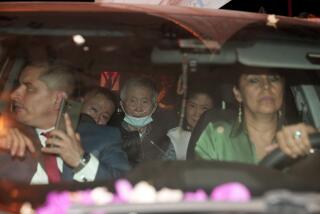E. Timor’s Former Governor Convicted in 1999 Massacre
- Share via
JAKARTA, Indonesia — The last Indonesian governor of East Timor was convicted Wednesday of crimes against humanity for allowing government-backed militias to slaughter more than 100 people in 1999, when the territory was part of Indonesia.
Former Gov. Jose Abilio Soares, who denied having any part in the killings, was sentenced to three years in prison, which some human rights activists criticized as too short. He was the first official convicted in Indonesia for his role in the destruction of East Timor after the territory voted overwhelmingly for independence three years ago.
“I’ve been made a scapegoat,” protested Soares, 53, after the verdict and sentence were read by the five-judge panel. “How could I, one person, disband a militia that is armed with spears, axes and guns?”
Human rights activists charged that the trial was a travesty because the special human rights court was not allowed to examine the role of the military in organizing and funding the militia gangs that killed 1,000 people and destroyed thousands of buildings.
“You almost have to come to the conclusion that the Indonesian government wanted to make sure that no real information would come out about its role in the violence in 1999,” said Sidney Jones, Indonesia project director of the International Crisis Group, a Brussels-based think tank.
Indonesia reluctantly established the ad hoc human rights court to prevent the United Nations from creating an international war crimes tribunal to investigate the East Timor atrocities.
Prosecutors indicted Soares and 17 other officials. Verdicts against some of the other defendants, including former East Timor Police Chief Timbul Silaen, are expected as early as today.
No charges were filed against top military leaders accused of responsibility for the mayhem, including Gen. Wiranto, then Indonesia’s armed forces chief. Nor did prosecutors indict top-ranking officers and officials named by Indonesia’s human rights commission in January 2000, critics note.
“The conduct of the trials confirms that their purpose was to deflect international criticism rather than to get at the truth,” said John Miller of New York-based East Timor Action Network. “Without an international tribunal, those most responsible for orchestrating the violence and devastation in 1999 and before will inevitably remain free.”
The verdict comes as the United States moves to end sanctions against the Indonesian military for its role in the devastation of East Timor.
The Clinton administration and Congress severed ties with the military in 1999 and demanded that those who ordered the slaughter be held responsible. But earlier this month, the Bush administration announced the resumption of military assistance to Indonesia, citing the country’s importance in the war against terrorism.
East Timor, a former Portuguese colony, was seized by Indonesian troops in 1975 and annexed the following year as Indonesia’s 27th province. East Timorese say as many as 200,000 people were killed during the subsequent 24 years of occupation.
After the 1998 fall of President Suharto, Indonesia’s longtime military dictator, the government allowed East Timor to vote on whether to become independent. But the powerful Indonesian military, which did not want to lose the province, organized militia gangs that intimidated voters months before the August 1999 election.
After East Timor voted overwhelmingly for independence, the militias ran amok, hacking people to death, destroying 70% of the province’s buildings, raping hundreds of women and driving 260,000 people--nearly a third of the population--across the border into Indonesian West Timor. Australian-led U.N. troops moved in and established peace in the territory, which officially became independent on May 20 this year.
As Indonesia’s appointed governor of the province in 1999, Soares was accused of failing to stop four planned killings that claimed the lives of more than 100 people, including the massacre of 22 people who had taken refuge at a church in Suai.
Soares, one of three Timorese among the 18 defendants, denied any role in the killings and said he attempted to mediate between the two sides by holding meetings at his house with the rival factions.
Jones, of the International Crisis Group, said the prosecution’s case against Soares was so weak that testimony by many of the government’s witnesses bolstered the defense case. Six of the 18 called to testify against the former governor were fellow defendants who will be tried on similar charges, she said.
“When you consider the fact that the prosecution presented almost no evidence, it’s as much a travesty of justice that he was convicted as if he was acquitted,” she said.
Other activists criticized the panel for sentencing Soares to prison for only three years for a crime that could have brought the death penalty. By Indonesian law, the minimum sentence for crimes against humanity is 10 years, said Asmara Nababan, secretary general of the country’s National Commission on Human Rights.
Chief Judge Emmy Murni Mustafa said Soares received a lighter sentence because of a request for leniency from East Timorese President Jose Alexandre Gusmao.
The former freedom fighter, who spent seven years in an Indonesian prison, sent a letter to the court last month saying Soares should not be “singled out” as the one responsible for the killings.
*
Sari Sudarsono of The Times’ Jakarta Bureau contributed to this report.
More to Read
Sign up for Essential California
The most important California stories and recommendations in your inbox every morning.
You may occasionally receive promotional content from the Los Angeles Times.













